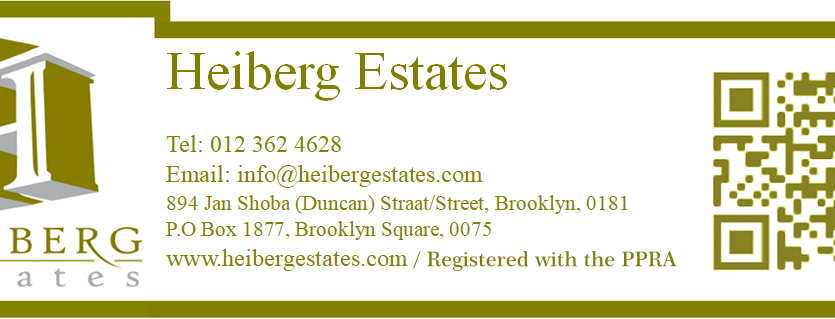HEIBERG ESTATES NEWSLETTER: JULY 2023

Dear Property Partners
With a much colder-than-normal July, at least there is some heartwarming and positive movement in our economy as well as in our property market. There was a broad front sigh of relief when the SA Reserve Bank (SARB) ten days ago left the repo rate unchanged on a 14-year high of 8.25%, this after 10 consecutive hikes over the past 21 months in its bid to curb inflation – our prime rate left at 11.75% for the time being. This decision was most probably made on the back of our inflation rate that decreased and returned to the upper end of the SARB inflation target band of between 3%-6%, easing by 0.9% to the 5.4% recorded during June and down from the 6.3% recorded during May – the lowest in almost two years since October 2021 when it was 5%.
Furthermore, in addition taking our stronger rand exchange rate into account in this latest decision, where the Rand recovered by 5% in June against the Dollar. Interesting to note that the FED in the USA also decided in June to leave their rate unchanged after ten rate increases of a combined 5% since April 2022, having a direct impact on us due to investment capital flowing out of our country when FED rates increase and which in turn has a negative impact on our rand exchange rate and inflation. Unfortunately, due to rising inflation, the FED again decided last week to increase their rate with 25 basic points from 5.25% to 5.5% – the highest interest rate in the USA in the past 22 years! The European Central Bank raised rates to 3.75% in May – the seventh time since July 2022, whilst the Bank Of England increased their rates for the thirteenth consecutive time to 5% in June. A worldwide softening housing market with declining house prices and sales volumes is now the norm due to rising interest-, as well as inflation rates.
Further good news is that Fitch did not further downgrade our credit rating since the end of 2021, maintaining its “BB-“ credit rating for South Africa with a stable outlook on our long-term foreign and local currency debt ratings. Thus, following suit when in May Standard & Poor’s Global Ratings, also kept our credit ratings on the same level with a stable outlook foreseen. More positive news is that Statistics SA announced a positive real growth rate of 0.4% for the first quarter where at least a recession was averted as during the previous quarter, the economy contracted by -1.1%. The SARB also positively revised its economic growth forecast for this year with a slightly higher 0.4% from an initial 0.3%, whilst for 2024 and 2025 the GDP forecasts remained unchanged at 1% and 1.1% respectively. A recently published FNB Commercial Property Survey indicates that commercial vacancy rates are slowly declining across all commercial property classes. So at least all is not doom and gloom.
Looking at the Construction Sector, activities are still under pressure in spite of our Government starting to lift its expenditure on infrastructure, but at least some silver linings are appearing. A recent report published by the well-acknowledged economist, Dr Roelof Botha, points out that compared to the first quarter 2022, employment in the Construction Sector increased by almost 12%. There is hope for the expansion of Private Public Partnerships (PPP’s) in the execution of infrastructure maintenance and development to pave the way for a revival in the Construction Sector that in return will also have a positive impact throughout our property market as a whole.
At least there is some positive news during a period whereas we know our economy and also the property sector, is under severe and continues downward pressure due to several factors. Unemployment, increasing load shedding, and rising interest rates are severely affecting people’s ability to get or to keep a roof over their heads.
Some of the latest interesting property-related facts and statistics are as follows:
- For the foreseeable future the Office Sector is expected to be under continued pressure due to our extended recessionary conditions and with demand fundamentals expected to remain weak due to staff downscaling and more effective use of office space as well as remote working alternatives.
- The Rode Report pointed to a national office vacancy rate of 14.9% as recorded during the 1st quarter of 2023 – down from a 16% average recorded in 2022. But we do need to take into account that with few new office block developments and less supply coming unto the market, this might have been a contributing factor.
- Also interesting to note that a recent FNB report points out the lack of newly built office space, is due to the fact that from January 2022 to January 2023, the sqm of new office space plans approved was -60.4% down on the 12 months to January 2018, whilst space completed was -72.4% less, pointing out that this sector didn’t recover after the Covid-19 lockdowns and the lagged impact thereof.
- On the Residential front StatsSA reports that in May 2023 the number of new residential plans passed, showed a year-on-year decline of -38.51% after a prior month’s decline of -15.07%. This illustrates the ongoing weakness in the Residential Building Sector with a visible lessening appetite amongst developers and homeowners to build and develop themselves. The lack of availability of basic bulk services in general but also specifically power supply, for sure contributes to this state of affairs.
- Statistics just released by FNB, show that residential buildings completions were still in year-on-year decline in May with -14.47% recorded versus the -30.32% recorded for the 3 months to May 2023 year-on-year – sectional title units showing the least decline.
- The Industrial Sector still remains to be the most robust under commercial properties where declining vacancy rates were recorded for ten consecutive quarters, and where a recent vacancy rate of -37.15% was recorded but less in magnitude than the prior quarter’s -46.51% as published by a recent FNB report.
- On the Retail front supply and demand plays a huge role where our negative GDP growth factor (expected to be only a mere -0.1% this year), will for sure play a major role in this increasingly under-pressure sector. Causing declining prospects for both business capacity expansions as well as growth expectations in retail space.
- Property demand for existing as well as newly built property/more affordable sectional title property, is still visibly moving sideways, following the post-Covid short-lived recovery, especially looking at our broad-based general inquiries and lower-than-normal show house attendances.
- Looking at the present economy, it makes sense to many prospective buyers to rather rent for the moment and save the difference between the monthly rental amount and the bond repayment amount in order to get a solid deposit together before buying a home. Especially with our house prices under downward pressure where house prices have not been keeping up with the rising inflation rate for some time now.
- With many Buyers opting to play a wait-and-see game, the rental market is picking up its head and interesting to note that amongst all bond applicants registered during last month, 10.9% were Buyers investing in the buy-to-let market – the highest percentage recorded since February 2009. In the popular Western Cape alone, 30.4% of bond applications were for investment properties.
- A recent July property report published by Lightstone Property Data, shows that bond registrations reduced by 43% during the second quarter this year – further illustrating the downward pressure on our property market and declining affordability under residential buyers. Homeowners are struggling to keep up with monthly bond repayments where for example presently a R2m bond, almost costs R6000 per month more to service than 21 months ago!
- With the escalating costs of servicing monthly bonds, property buyers are now paying higher deposits in order to reduce their monthly repayments and the average deposit paid during the first quarter, increased from 7.5% of the purchase price to 8.4% as recorded during the second quarter. Interesting to note that under first-time buyers, the average deposit paid is now 9.6% of the purchase price – 15.2% more than a year ago.
- Affordability is under pressure as illustrated especially under first-time buyer bond applicants. During June ooba reported that first-time buyers declined to 46.5% of all bond applications in comparison to the 48.2% recorded during the second quarter of this year and the 56.2% recorded during May 2020.
- Competition to offer the best possible interest rate amongst the financial institutions are fierce in order to keep or to create new business. At present the average discount under the prime rate, is 0.41% vs the 0.3% offered a year ago.
- With continued strong headwinds, FNB in its latest property report predicts average residential property prices to slow down to 1.8% year-on-year in 2023, compared to the 3.5% y/y recorded in 2022, and an estimated 1.1% for 2024 and 1.4% for 2025 at this stage.
With some positive news to be grateful for as pointed out above, we still need to be realistic as our fragile rand exchange rate and increasing load shedding, are two major factors challenging our inflation rate and the bid to keep it within the SARB’s target band of 3% to 6%. We need a greater energy supply from alternative sources in order to create sustainable jobs, broaden our tax base, and place prospective home buyers in a better position to obtain and keep properties as well as to grow our economy in general.
Although the SARB did not increase the repo rate there are no signs of any rate decreases in the immediate future as the aim is first to get a sustained inflation rate of around 4.5% and at this stage, broad front predictions are that our average inflation rate for this year will be around 6%. Realistically our SA Property Market is not expected to deliver fireworks for some time to come with the rising costs of debt, inflationary pressures, and its ripple effect felt throughout every sector of our fragile economy and property sectors.
Please stay in touch and view our website for our latest listings: www.heibergestates.com

We remain to be on 24/7 standby for you, so please don’t hesitate to contact us for any property-related matters!
Sincerely and with warm regards
Bambie & Heiberg Estates Team.






